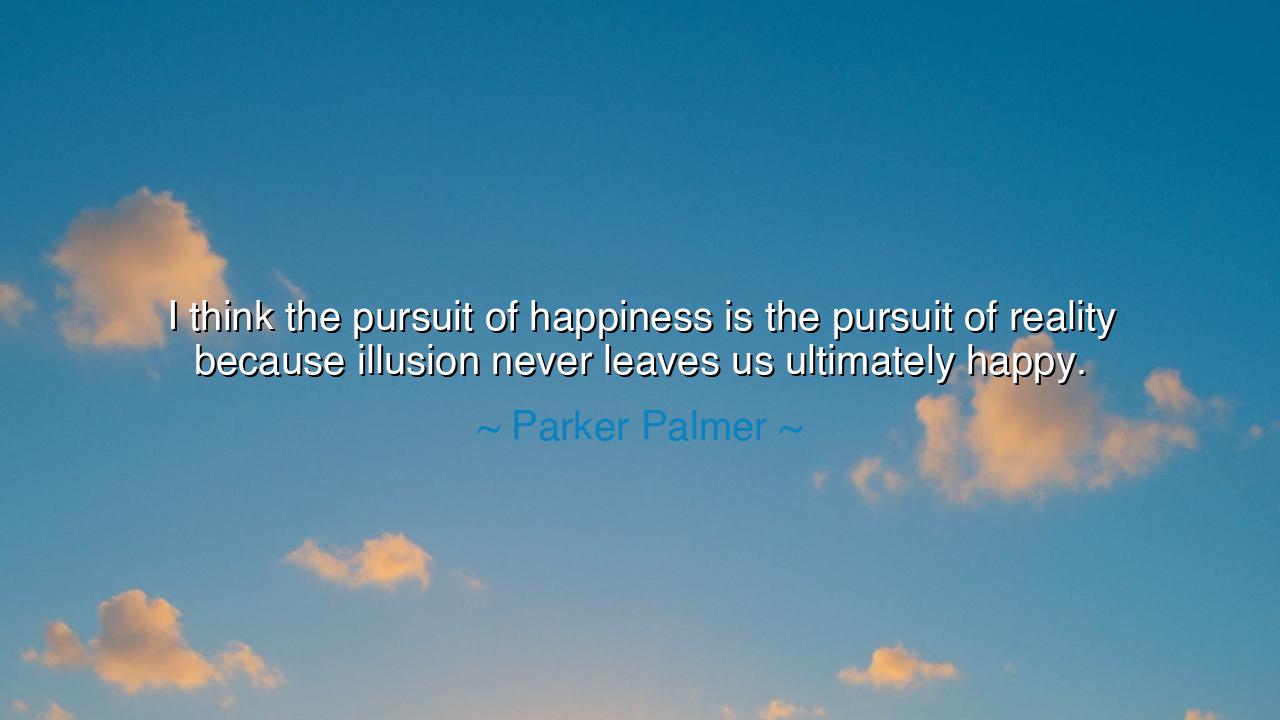
I think the pursuit of happiness is the pursuit of reality
I think the pursuit of happiness is the pursuit of reality because illusion never leaves us ultimately happy.






The wise and soulful teacher Parker Palmer, whose writings have illuminated the inner landscapes of the human spirit, once said: “I think the pursuit of happiness is the pursuit of reality because illusion never leaves us ultimately happy.” In these few words, there lies an entire philosophy of life — a truth that pierces through the fog of false joys and imagined contentment. Palmer’s insight calls us back from the shimmering mirages of illusion to the grounded soil of reality, reminding us that true happiness is not found in fantasy or denial, but in the clear-eyed embrace of what is. For illusion, however comforting at first, is a fragile shelter — and when it crumbles, we are left emptier than before.
The origin of this reflection springs from Palmer’s lifelong search for authenticity — a journey marked by both grace and suffering. As a scholar, teacher, and spiritual writer, he wrestled with depression, disillusionment, and the false promises of success. Through his struggle, he discovered that the greatest pain often comes not from the world’s harshness, but from our refusal to see it as it truly is. Illusion, he realized, is seductive because it spares us from discomfort — it allows us to believe we are loved when we are only admired, to think we are free when we are merely distracted, to feel safe while we are slowly losing our souls. Thus, when Palmer speaks of the pursuit of reality, he is describing the sacred act of waking up — of turning toward the truth, however painful, for it is only in truth that joy can take root.
To say that “illusion never leaves us ultimately happy” is to recognize the emptiness at the heart of every lie we tell ourselves. The illusion of perfection fades when we grow weary of pretending. The illusion of control collapses when life humbles us. The illusion of eternal pleasure dissolves when the heart longs for meaning instead of stimulation. History itself bears witness to this law. The emperor Nero, surrounded by gold and spectacle, found no peace; he built illusions of grandeur but drowned in his own vanity. Meanwhile, a humble monk like Francis of Assisi, stripped of all possessions, walked barefoot through the dust yet sang with the joy of heaven. Why? Because one sought happiness through illusion, and the other through reality.
Reality, Palmer reminds us, is not always gentle. It reveals our wounds, our limits, our frailty. But in accepting these, we also uncover our strength. The one who faces reality — who dares to see life without disguise — discovers a deeper kind of happiness, one born of wholeness. It is the peace that comes when the mask falls away, when we stop striving to be someone else and begin to live as we truly are. Reality is not the enemy of happiness; it is its foundation. For only what is real can endure, and only what endures can sustain joy.
The story of Nelson Mandela offers a radiant example. Imprisoned for twenty-seven years, he was stripped of freedom, comfort, and illusion alike. He could have survived through bitterness or delusion, but instead, he embraced reality — the truth of his suffering and the humanity of even his captors. In doing so, he found a joy that no prison could contain. His happiness did not depend on circumstance but on clarity of spirit. In his acceptance of reality, he became free long before his body left the cell. This is the wisdom Palmer speaks of: that happiness and reality are not opposites but reflections of the same truth.
To pursue happiness, then, is not to chase pleasure, comfort, or distraction — it is to pursue truth. It means asking, “What is real here? What is true about me, about others, about the world?” It means daring to look beyond the illusions of success and status, beyond the glossy images of perfection that surround us. It requires courage — for truth can wound before it heals — yet those wounds are the openings through which light enters the soul. The ancients knew this well: the Oracle of Delphi declared, “Know thyself,” for self-knowledge is the doorway to freedom.
Let this, then, be the lesson carried forward: seek reality, and happiness will follow. Do not fear the stripping away of illusion, for it is not loss but liberation. Practice honesty in your words, simplicity in your desires, and compassion in your judgments. Sit with truth even when it is uncomfortable, for from that stillness arises the joy that does not fade. Remember always that the pursuit of illusion leads only to emptiness, while the pursuit of reality leads to peace.
And so, as Parker Palmer teaches, let the heart’s journey be not a flight from truth but a pilgrimage toward it. For the soul that dares to live in reality — in the raw, unvarnished beauty of what is — finds that happiness is not a distant dream to be chased, but a quiet flame already burning within.






AAdministratorAdministrator
Welcome, honored guests. Please leave a comment, we will respond soon